欧洲文化史
欧洲文化史的研究

欧洲文化史的研究欧洲文化史指的是欧洲地区的文化发展历史,这里所指的文化是指一种民族或社会的思想、风俗、习惯、宗教等各种文化现象的总和。
欧洲文化史的研究范围涵盖了古代、中世纪和现代三个历史时期,也擅长通过研究文化现象的变迁来理解欧洲社会的演变。
本文将从不同角度来探讨欧洲文化史的研究。
一、欧洲史的分类研究欧洲文化史的研究,首先是要对欧洲史进行分类,“史”在这里是要指代一种包含了历史、文化、思想等方面的综合性研究。
学者们通常会从欧洲史的国家、地区、文化、艺术等不同角度进行分类,以便于更好地研究具体的历史事件、文化现象以及它们之间的联系。
从国家角度上看,欧洲各个国家都有着自己的历史和文化,研究者们可以按照不同国家的历史背景来探讨某一个文化现象的演变,比如“意大利文艺复兴”。
从地区角度上看,欧洲划分为东欧和西欧两个大区,而在这两个大区中还有更细致的划分,比如北欧、中欧和南欧,研究者们可以利用这些划分来研究欧洲某个区域的文化差异和发展规律。
从文化角度上看,欧洲有着众多的文化,包括了艺术、哲学、宗教、法律等多个领域,研究者们可以从不同的文化领域入手,探讨同一或不同文化领域中的文化变迁和发展。
二、欧洲文化史的主要时期欧洲文化史可以分为古代、中世纪、近代和现代四个主要历史时期,每个时期都有着独特的文化特征和发展规律。
古代指的是公元前776年到公元476年的历史时期,包括了希腊、罗马两大古典文明,以及据说于公元6世纪左右开始建立的君士坦丁堡的拜占廷帝国。
研究者们可以从古代文化遗产中梳理出古代的文化特征和变迁规律。
中世纪指的是公元476年到公元1453年的历史时期,包括了罗马帝国西部灭亡、大批日耳曼部落从北方迁入欧洲、天主教成为欧洲基督教总教区等历史事件。
研究者们可以从中世纪的天主教文化、城市化、手工业等方面研究中世纪文化的发展规律。
近代指的是公元1453年到1789年的历史时期,这个时期可以说是欧洲文化史上的一个分水岭,因为在这个时期里,欧洲发生了宗教改革、地理发现、科学爆炸等许多对整个欧洲思想、文化的颠覆性变革。
希腊文化--欧洲文化史复习资料
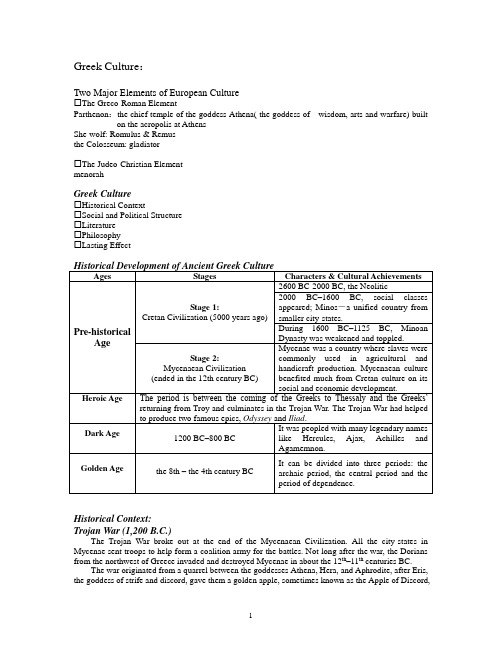
Greek Culture:Two Major Elements of European Culture☐The Greco-Roman ElementParthenon:the chief temple of the goddess Athena( the goddess of wisdom, arts and warfare) built on the acropolis at AthensShe-wolf: Romulus & Remusthe Colosseum: gladiator☐The Judeo-Christian ElementmenorahGreek Culture☐Historical Context☐Social and Political Structure☐Literature☐Philosophy☐Lasting EffectHistorical Context:Trojan War (1,200 B.C.)The Trojan War broke out at the end of the Mycenaean Civilization. All the city-states in Mycenae sent troops to help form a coalition army for the battles. Not long after the war, the Dorians from the northwest of Greece invaded and destroyed Mycenae in about the 12th–11th centuries BC.The war originated from a quarrel between the goddesses Athena, Hera, and Aphrodite, after Eris, the goddess of strife and discord, gave them a golden apple, sometimes known as the Apple of Discord,marked ―for the fairest‖. Zeus sent the goddesses to Paris, who judged that Aphrodite, as ―the fairest‖, should receive the apple. In exchange, Aphrodite made Helen, the most beautiful of all women and wife of Menelaus, fall in love with Paris, who took her to Troy. Agamemnon, the king of Mycenae and the brother of Helen’s husband Menelaus, waged a war against Troy.☐Direct Fuse: the stolen wife☐Root Cause: ambition to conquer the worldLeaders on Both SidesThe Trojan: Priam, Hector, ParisThe Greek: Menelaus, Agamemnon, Odysseus, Achilles, Patroclus, AjaxConsequences of the War☐Burning of TroyEstablishment of Rome: Virgil: AeneidGreek mythology:Mount Olympus:the ―home of the gods‖. The deities who dwelled on this mountain were ruled by Zeus, included his wife, his brothers, his sisters and his children.The Olympian GodsZeus(宙斯): the heavenly king of the gods and ruler of mankindPoseidon(波塞冬): the moody god of the seasHades(哈得斯): the gloomy god of the underworldHestia (赫斯提): the calm goddess of the hearthHera(赫拉): the mature goddess of the family; sister & wife of ZeusAres(阿瑞斯): the fierce god of the warAthena(雅典娜): the sophisticated goddess of wisdom and artsApollo(阿波罗): the youthful god of the sun and the musicAphrodite(阿芙罗狄蒂): the sensual goddess of love and beautyHermes(赫尔墨斯): the cunning god of the tradeArtemis (阿耳特弥斯): the wild goddess of the huntHephaestus (赫菲斯托斯): the ill-favored god of metallurgyProsperity of Greek Culture (5th century B.C.)☐Repulse of the Persian Invasion: the pass of Thermopylae (480 B.C.)☐The establishment of democracy☐The flourisng of science, philosophy, literature, art and historical writing in AthensThe Persian InvasionSpartans: Leonidas, the KingPersian: Xerxes☐Stranger; take word to Sparta:here we lie, obeying her orders.-------- Herodotus, Father of HistoryAlexander, King of Macedon(4th century B. C.)☐Unification of all Greece☐Conquest of Europe, Asia and AfricaWide spread of Greek Culture: Egypt: AlexandriaSocial & Political Structure☐polis (city-state)☐Democracy: ―exercise of power by the whole people‖ (adult male citizens) Slave labour: harsh exploitationOlympic Games: ―Citius-Altius-Fortius‖Greek Literature☐Epics☐Lyrics☐Drama☐Allegories: AesopHomer:Iliad: the war of TroyOdyssey: the return of Odysseus to his home: IthacaLyric PoetryLyrics: poetry that expresses direct personal feelingsPindar:odes: expression of noble feelings, often in celebration of special events Sappho (Lesbos):In gold sandalsdawn like a thieffell upon me.Drama (5th Century. B.C.)TragedyAeschylus: Prometheus Bound, Persians, AgamemnonSophocles: Oedipus the King, Electra, AntigoneEuripides:Andromache, Medea, Trojan WomenComedyAristophanes: Frogs, Clouds, Wasps, Birds“As for comic Aristophanes,The dog too witty and too profane is.”------Jonathan SwiftPhilosophy & Science☐The spirit of free enquiry☐Ready to drop established ideas☐To speculate, to use their imagination and to form their own conclusionsMinor Scientists & Thinkers☐Pythagoras:founder of scientific mathematics; point, line, bodythe first theory of propotion; Everything is numbers.☐Heracleitue/Heraclitusfire: primary element of the universe―all is flux, nothing is stationary‖―You cannot step twice into the s ame river; for fresh waters are ever flowing in upon you. The sun is new everyday.‖☐Democritus:the atomic structure of matter; the earliest exponent of the atomic theory:Material world is composed of tiny, inseparable particles called atoms.―It is right, since we are human, that we should not laugh at human misfortunes but lament them‖☐Euclidestablished the science of plane geometry; Elements: a textbook of geometry☐ArchimedesThe principle of the lever ―Give me a place to stand, and I will move the world‖PhilosophySocrates (about 470-399 B.C.)☐Dialogues☐one of the founders of Western philosophy☐The dialectical method☐―The Apology of Socrates‖―The hour of departure has arrived, and we go our ways—I to die, and you to live. Which is better God only knows.‖Plato (about 428-348 B.C.)☐Dialogues―Plato was essentially a poet—the truth and splendor of his imagery, and the melody of his language, are the most intense that it is possible to conceive‖—— Shelley☐Republic : the ideal state ruled by a philosopher but barring poets☐Idealism: only ―ideas‖ are completely real; the physical world is relatively real.☐The AcademyAristotle (384-322 B.C.)☐Tutor of Alexander―the master of those who know‖ —Dante☐Ethics, Politics, Poetics, Rhetoric☐Materialism:direct observation of nature; theory should follow facts.Greek Culture: Two WarsGreek Civilization came to its peak during Pericles’ reign and then began to decline, during which two wars broke out with profound meanings.One is the war between Greek city-states and Persian invaders (499 BC–449 BC). The victory laid the foundation for the development and prosperity of Greece.However, peace and stability did not last long after the victory because a split occurred between the two strongest city-states (459 BC–404 BC) , thus leading to the decline of Athens and most poleis involved in the war. Till 146 BC, the regions of Greek Peninsula and Aegean Sea islands were allseized and conquered by Roman troops and merged into the map of Roman Empire.Pericles:Athenian statesman whose leadership contributed to Athen's political and cultural supremacy in Greece; he ordered the construction of the Parthenon (died in 429 BC).Sophists☐Teachers of the art of arguing☐Protagoras: “Man is the measure of all things.”Contending Schools of Thought (4th Century, B.C.)☐The Cynics: Diogenesself-sufficiency & extreme simplicity in life; no patience with the rich and powerful☐The Sceptics: Pyrrhonnot all knowledge was attainabledoubt the truth of what others accepted as true☐The Epicureans: Epicuruspleasure: the highest good in life;freedom from pain and emotional upheavalthe practice of virtueMisunderstanding: indulgence in luxurious living☐The Stoics: Zenothe most important thing in life: dutyendure hardship and misfortune with courageChinese PhilosophersSpring & Autumn Period (770-476 B. C.)☐Lao Tzu (604-531 B. C.):Tao Te Tsing☐Confucius (551-479 B. C.):The AnalectsWarring States (475-221 B. C.)Historical WritingsGreek history has contributed considerably to the constitution of Greek and Western civilization with its abundant documents of a variety of historical events and figures scattered in social, political, military and cultural fields. The most famous historians are Herodotus(485 BC–425 BC) and Thucydides(about 460 BC–404 BC).●Herodotus is generally acknowledged as the first reputed historian of Greece.●―Father of History‖●His writing Histories objectively describes the war between Persians and Greece.●―that the great and wonderful deeds done by Greeks and Persians should not lack renown.‖●Thucydides is generally acknowledged as one of the greatest of ancient Greece for histruthfulness, conciseness and imagination.●―the greatest historian that ever lived.‖ (Macaulay: English Historian)●His History of the Peloponnesian War recounts the struggle between Athens and Sparta in the5th century BC, as the first recorded political and moral analysis of a nation’s war policies. Architecture☐Temples: Parthenon☐The Doric style; The Ionic style; The Corinthian styleThe Doric style☐masculine style:☐sturdy, powerful, severelooking; monotous☐showing a good sense of proportionThe Ionic style☐feminine style☐graceful and elegant; a wealth of ornamentThe Corinthian style☐ornamental luxurySculpture☐the earliest: Gods: stiff, lifeless☐5 th C. B.C.: the beauty of the internal structure of human bodies and mythological figuresVenus de Milo(Aphrodite of Milos):symbol of beauty&grace; a personification of vitality and dignity Discus Thrower:relaxation and contraction of the muscleLaocoon Group: facial expression: fear, sympathyPottery☐Domestic needs & foreign trade☐Jars and other utesnsils☐The varying shapes and beautiful figures painted on them reflected the high degree of Greek civilization.black-figure paintings:☐Paintings on pottery that have red background and black figurered-figure paintings:☐Paintings on pottery that have black background and red figureLasting Effect☐To understand the world by the use of human reason☐Greece is every Western man’s second nature.☐Influence on LiteratureByron: Isles of Greece Shelley: Hellas & Prometheus UnboundKeats: Ode on a Grecian Urn James Joyce: UlyssesThe influence on Western civilizationGreek culture is often termed the cradle of the Western civilization and has had an enormous impact on Western culture. The specific contributions are found in the areas of philosophy, politics, literature, art, science and architecture.Greek politics was one of the greatest influences on the Western civilization. The Greeks were the first to successfully create a government based on the consensus of the people and thus provided a foundation for Western democracy.The second significant influence was that of philosophy. The Socratic idea about ethics and knowledge helped the Westerners care more for the effect of knowledge and value of morality, both of which give sound guidance to people in the later years to improve and change the world outside themselves, i.e., human society and the natural world.Later generations of Westerners have benefited a lot from Greek culture, such as those in painting, sculpture, architecture, drama, poetry and historical works. Classicism had Greek culture as one of the crucial sources, and this has helped Westerners so much that they ascribed the origin of the Renaissance to it. This changed the intellectual conditions of the later medieval period and opened the way to the modern era in the West.。
欧洲文化史11(十九世纪西方文化)

(1)作为表象的世界。 叔本华认为,人所认识的 一切事物并非自在之物,而只是呈现于人的表 象、即意识中的东西,都相对于作为主体的人 而存在,“世界是我的表象”。
(2)作为意志的世界。他认为存在的东西本身, 即自在之物,只能是意志。
(3)理性和直觉。叔本华将认识分为两种:一 种是科学的理性和概念的认识,另一种是非理 性的、非科学的认识。
换言之,经验为知识提供材料,而主体则 为知识提供对这些材料进行加工整理的形式, 知识就其内容而言是经验的,但就其形式而言 则是先天的。科学知识的普遍必然性由此就得 到了证明。这就是被人们称之为“哥白尼式的 革命”的康德哲学革命。
康德的“哥白尼革命”以其独特的方式证 明了科学知识的普遍必然性,突出了主体在认 识中的地位、作用和能动性。
▪
——量
▪
——度
▪
——本质论
——本质作为实存的根据
▪
——现象
▪
——现实
▪
——概念论
——主观概念
▪
——客观概念
▪
——理念
自然哲学 ——力学
——空间和时间
▪
——有限力学
▪
——绝对力学
▪
——物理学
——普遍个体物理学
▪
——特殊个体物理学
▪
——总体个体物理学
▪
——有机物理学 ——地质自然界
▪
——植物有机体
▪
——动物有机体
精神哲学 ——主观精神
——人类学——灵魂
▪
——现象学——意识
▪
——心理——精神
▪
——客观精神
——抽象法权
▪
——道德
▪
——社会伦理
▪
欧洲文化史4(中世纪与封建社会)综述
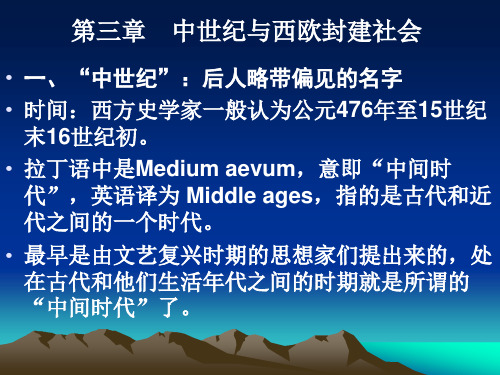
•
自 从 1071 年 耶 路 撒 冷 落 入 凶 悍 的 塞 尔 柱 突 厥 人 (奥斯曼土耳其前身)之手以后,西方基督徒的朝 觐活动不得不中止,圣地也遭到异教徒的破坏和亵 渎
•
格利哥里七世在位时( 1073—1085 年)就曾经策 划组织十字军东征之事,乌尔班二世任教皇时开始 付诸实施。首批十字军于 1096 年在“穷汉”瓦尔特 和“隐士”彼得的率领下从法国出发,这群乌合之 众后来与由贵族们率领的十字军主力部队汇合在一 起,终于在1099年7月15日攻占耶路撒冷
•
•
(二) 教会与大学
中 世 纪 的 大 学 授 课 ( 世 纪 后 半 叶 手 稿 )
14
•
在文化水平相对较高的意大利,早在9世纪时就已经 出现了一批研究罗马法的专业学校。11世纪在意大利 的波伦那产生了西欧第一个由专业性学校合并而成的 多学科性质的学校(studium generale),这种学校 被称为“大学”(Universitas) 早期的大学都是隶属于教会的,管理者是教堂和修 道院的教士或僧侣,教师通常是地位较低的教士 到了十三世纪。学者的地位与官吏、教士鼎足而三 了,13世纪托钵僧团的出现进一步推动了欧洲大学的 发展
• 农奴(serf)制。虽然农奴并不自由,要对领主承担许 多义务,他们却并不等同于奴隶。 • 庄园(manor)经济。庄园由领主的领地和领地上的村 庄构成。庄园的经济是自给自足的经济。
庄 园 示 意 图
随着欧洲封建制度生产关系的确立,骑 (三)骑士制度 士阶层在10世纪到11世纪真正形成,而不是 中世纪的开始,骑士作为一个成熟的制度以 及兵种来存在的时间只有5个世纪左右的时间。 在12世纪,西欧形成骑士制度。 骑士制度是中世纪欧洲封建制度的柱石 和组成部分,具有社会的、政治的、军事的、 宗教的和文化的意义。 严格的说,骑士属于封建贵族的末流即 小贵族,是为国王和大贵族服务的职业军人, 而不属于“真正的贵族”。一般来说,贵族 肯定是骑士,但骑士不一定都是贵族。
欧洲文化史的五个阶段

欧洲文化史欧洲文化略分五个时期。
一、古典时期( the Classic Age, 1200 B.C~476 A.D)主要是古希腊文明(the Ancient Greek Civilization)及古罗马文明(the Ancient Roman Civilization)。
奉行的是异教徒的信仰和实践(Paganism)。
异教徒指非基督教徒,非犹太教徒,非伊斯兰教徒。
理念上鲜有束缚,实践中享受人生,个性突出,热情奔放,创造力旺盛,风格多姿多彩。
二、中世纪时期(the Middle Ages, 476~1453)主要是罗马天主教的教会文化(the Church Culture),强调人的原罪(the original sin),人性受到压抑(inhibited),文化上是一泓死水(cultural backwater)。
这一时期的主流是对古典时期的反动。
反主流的代表人物是但丁( Alighier,Dante,l265~1321),杰作是史诗《神曲》(Divine Comedy)。
三、文艺复兴时期(the Renaissance, 15~16C)古典主义的复兴,遵循的是人文主义(Humanism),这是对中世纪经院哲学(Scholasticism)的对抗(reaction)。
代表人物有:1. 米开朗琪罗(Michelangelo Buonarroti,1475~1564):代表作有梵蒂冈教皇(Pope,pontiff)专用西斯庭小教堂(The Sistine chapel)穹顶上的壁画《创世纪》,(Genesis)以及圣坛后的壁画《最后的审判》(The Last Judgment),雕塑《大卫》(David)等。
米氏又是建筑师、诗人。
2. 达芬奇(Leonardo da Vinci,1452~1519):代表作有《蒙娜丽莎》(Mona Lisa),《最后的晚餐》,(The last Supper)。
是画家,又是雕塑家、建筑师、音乐家、工程师,确是多才多艺(versatile)。
欧洲文化史12(二十世纪的西方文化)
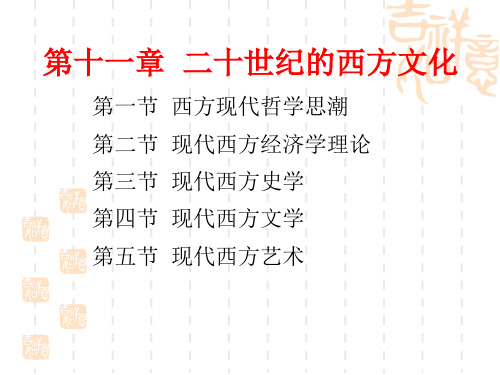
英国的阿诺德· 汤因比继承并发展了斯 宾格勒的观点。他的代表作是12卷的《历 史研究》。他把人类历史分为21种文明。 汤因比认为这些“文明”都要经过5个阶段, 即“发生”、“成长”、“破坏”、“崩溃” 和“死 亡”。他指出,“文明”的起源、生长、衰 落、解体有其原因和机制,文明的灭亡可 以用某种明智的、及时的措施来防范。这 在一定程度上体现了欧美资产阶级对未来 的期望。
让· 保尔· 萨特(1905——1980)是法国哲学家 家、作家、无神论者存在主义的代表人物。 他专门研究和阐明人的存在的哲学。萨特宣扬 人生的荒诞的:人生下来就遇到烦恼、忧虑、恐 怖、充满着痛苦,斗争、拼搏是徒劳的。人的力量 是微弱、渺小和整个社会的大机器相比显得太脆弱 了。萨特认为,人的存在先于人的本质。他说:“人 之初,是空无所有;只是后来,人需要变成某种东 西,于是人就按照自己的意志而造就他自身。” 萨 特的名言是“人命注定是自由的”。这为极端个人主 义和无政府主义提供了理论依据。萨特还宣扬人的 超越自我。他认为人在做着自由的选择,而每一次 选择就是一次超越。这样人就按照自己的意志和可 能进行着选择,来完成不断的超越。
属于后一种非理性主义的哲学流派有唯意志 论、生命哲学、现象学、弗洛伊德主义、存在主 义、分析哲学、法兰克富学派和实用主义哲学 等。唯意志论的代表人物叔本华和尼采;生命哲 学的代表是伏尔泰和柏格森;现象学的代表是德 国的胡塞尔;心理分析学派的代表人物是弗洛伊 德;存在主义的代表人物是丹麦的克尔凯郭尔和 萨特;分析哲学的代表是罗素和维持根斯坦;法 兰克福学派的代表只霍克海默;实用主义哲学的 代表是杜维。在这些流派中,影响最大的哲学家 有叔本华、尼采、柏格森、弗洛伊德和萨特。
2.批判的、分析的历史哲学
批判的、分析的历史哲学以新的自然科学和新 的哲学观念为基础,对19世纪西方占统治地位的实 证主义史学进行了尖锐的批判。 意大利的克罗齐认为,历史研究的目的不是复 制和再现过去,而是回答和解决现实生活所提出的 多种理论问题。 英国的科林伍德则提出一切历史都是思想史的 口号,认为历史不是孤立的、个别事件的集合,而 是无始无终的过程,研究历史是要透过事件的表象 去辨析出其中的思想来。 批判、分析的历史学开阔了人们的视野,有助 于人们思想的澄清和认识的深化。历史哲学从思辨 到分析的转变,使史学与哲学之间建立了一种更为 密切的关系,但同时,它也使历史似乎成了艺术和 哲学一类的东西,使它丧失了科学的地位。
欧洲文化史
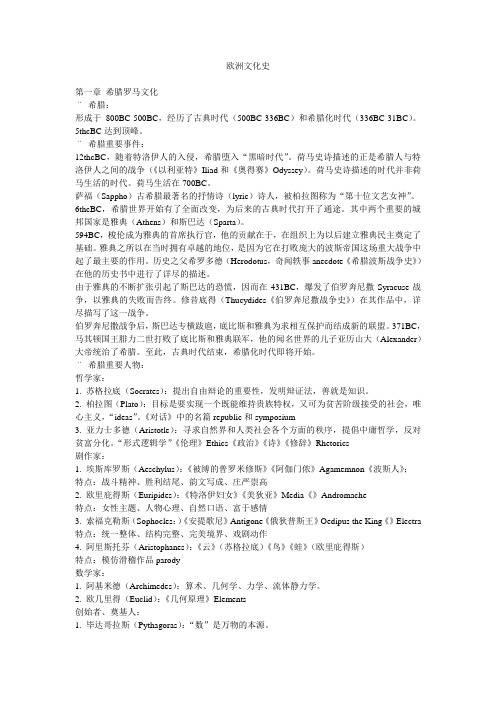
欧洲文化史第一章希腊罗马文化¨希腊:形成于800BC-500BC,经历了古典时代(500BC-336BC)和希腊化时代(336BC-31BC)。
5thcBC达到顶峰。
¨希腊重要事件:12thcBC,随着特洛伊人的入侵,希腊堕入“黑暗时代”。
荷马史诗描述的正是希腊人与特洛伊人之间的战争(《以利亚特》Iliad和《奥得赛》Odyssey)。
荷马史诗描述的时代并非荷马生活的时代。
荷马生活在700BC。
萨福(Sappho)古希腊最著名的抒情诗(lyric)诗人,被柏拉图称为“第十位文艺女神”。
6thcBC,希腊世界开始有了全面改变,为后来的古典时代打开了通途。
其中两个重要的城邦国家是雅典(Athens)和斯巴达(Sparta)。
594BC,梭伦成为雅典的首席执行官,他的贡献在于,在组织上为以后建立雅典民主奠定了基础。
雅典之所以在当时拥有卓越的地位,是因为它在打败庞大的波斯帝国这场重大战争中起了最主要的作用。
历史之父希罗多德(Herodotus,奇闻轶事anecdote《希腊波斯战争史》)在他的历史书中进行了详尽的描述。
由于雅典的不断扩张引起了斯巴达的恐慌,因而在431BC,爆发了伯罗奔尼撒Syracuse战争,以雅典的失败而告终。
修昔底得(Thucydides《伯罗奔尼撒战争史》)在其作品中,详尽描写了这一战争。
伯罗奔尼撒战争后,斯巴达专横跋扈,底比斯和雅典为求相互保护而结成新的联盟。
371BC,马其顿国王腓力二世打败了底比斯和雅典联军,他的闻名世界的儿子亚历山大(Alexander)大帝统治了希腊。
至此,古典时代结束,希腊化时代即将开始。
¨希腊重要人物:哲学家:1. 苏格拉底(Socrates):提出自由辩论的重要性,发明辩证法,善就是知识。
2. 柏拉图(Plato):目标是要实现一个既能维持贵族特权,又可为贫苦阶级接受的社会,唯心主义,“ideas”。
《对话》中的名篇republic和symposium3. 亚力士多德(Aristotle):寻求自然界和人类社会各个方面的秩序,提倡中庸哲学,反对贫富分化。
与欧洲文化有关书籍
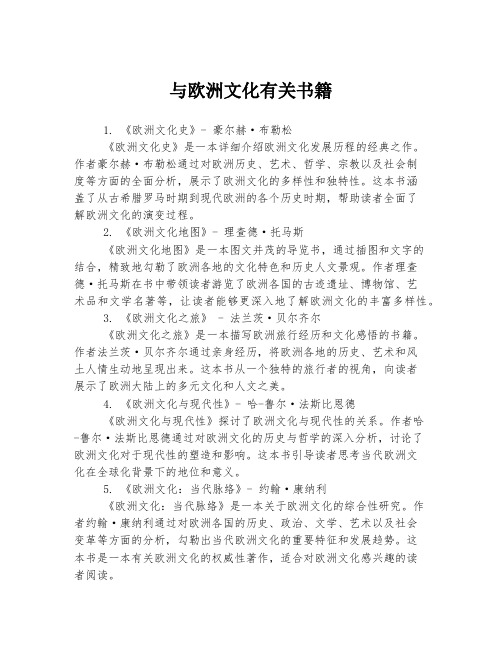
与欧洲文化有关书籍1. 《欧洲文化史》- 豪尔赫·布勒松《欧洲文化史》是一本详细介绍欧洲文化发展历程的经典之作。
作者豪尔赫·布勒松通过对欧洲历史、艺术、哲学、宗教以及社会制度等方面的全面分析,展示了欧洲文化的多样性和独特性。
这本书涵盖了从古希腊罗马时期到现代欧洲的各个历史时期,帮助读者全面了解欧洲文化的演变过程。
2. 《欧洲文化地图》- 理查德·托马斯《欧洲文化地图》是一本图文并茂的导览书,通过插图和文字的结合,精致地勾勒了欧洲各地的文化特色和历史人文景观。
作者理查德·托马斯在书中带领读者游览了欧洲各国的古迹遗址、博物馆、艺术品和文学名著等,让读者能够更深入地了解欧洲文化的丰富多样性。
3. 《欧洲文化之旅》 - 法兰茨·贝尔齐尔《欧洲文化之旅》是一本描写欧洲旅行经历和文化感悟的书籍。
作者法兰茨·贝尔齐尔通过亲身经历,将欧洲各地的历史、艺术和风土人情生动地呈现出来。
这本书从一个独特的旅行者的视角,向读者展示了欧洲大陆上的多元文化和人文之美。
4. 《欧洲文化与现代性》- 哈-鲁尔·法斯比恩德《欧洲文化与现代性》探讨了欧洲文化与现代性的关系。
作者哈-鲁尔·法斯比恩德通过对欧洲文化的历史与哲学的深入分析,讨论了欧洲文化对于现代性的塑造和影响。
这本书引导读者思考当代欧洲文化在全球化背景下的地位和意义。
5. 《欧洲文化:当代脉络》- 约翰·康纳利《欧洲文化:当代脉络》是一本关于欧洲文化的综合性研究。
作者约翰·康纳利通过对欧洲各国的历史、政治、文学、艺术以及社会变革等方面的分析,勾勒出当代欧洲文化的重要特征和发展趋势。
这本书是一本有关欧洲文化的权威性著作,适合对欧洲文化感兴趣的读者阅读。
分析欧洲文化史上的变迁与发展

分析欧洲文化史上的变迁与发展欧洲文化史是世界文化发展史中一个极为重要的组成部分,也是世界文化发展史的重要的组成部分。
从古典时期到现代,欧洲文化历经了许多变迁与发展。
今天我们来谈一谈欧洲文化史上的变迁与发展。
一、古希腊文化与古罗马文化欧洲文化史上的第一个重要时期是古希腊文化与古罗马文化的时期。
古希腊文化代表了欧洲文化史上的黄金时代,其著名思想家、文学家、哲学家等,对后世文化产生了深远的影响。
而古罗马文化则是建立在古希腊文化之上,但并非完全复制古希腊文化,它在制度、法律、建筑、教育等许多方面都对欧洲文化产生了深远影响,成为欧洲文化史上又一个独特的时期。
二、中世纪文化中世纪文化是欧洲文化史上的又一个重要时期。
在此期间,基督教教义逐渐成为主流,许多教育、艺术、文学、哲学等方面都受到了基督教的影响。
在中世纪时期,拉丁文仍然是主要的语言,学者们可以看到、学习和传承古典文化,如希腊语和拉丁语文化。
此外,修道院也成为学术和文化中心。
三、文艺复兴文艺复兴是欧洲文化历史上的又一个重要时期。
在这个时期,古典文化得以重新发掘和传承。
艺术、文学、哲学等领域都经历了巨大的变革和创新。
这个时期的思想家和教育家们不再仅仅是研究神秘论和神学,而是开始探讨人文主义、启蒙和自然主义等更加现实的问题。
人们追求人类和自然界的发展和进步、以及自由、平等、民主等价值。
四、启蒙运动启蒙运动是欧洲文化史上的又一个重要时期。
它是文艺复兴的延续,也继承了古典文化和中世纪哲学的传统。
在这个时期,人们追求认识和知识的自由,强调理性、科学、自由和平等,并经常发表批评宗教制度、政治和社会不公正的言论。
启蒙运动为欧洲新时代的到来铺平了道路,成为欧洲文化史上的一个里程碑。
五、现代文化现代文化是欧洲文化史上的又一个重要时期。
在这个时期,人类发展和进步的速度越来越快,科技和经济的发展开始影响文化。
人们开始关注代表性和流行性,反对传统、规范和限制。
他们注意到世界各地的文化和民族之间的联系和交流,同时也更加关注个体和个人的发展和实现。
欧洲文化史--The-Seventeenth-Century

The Seventeenth CenturyGeneral IntroductionIn the 17th century, Europe advanced from the Middle Ages to the modern times."The modern world, so far as mental outlook is concerned, begins in the seventeenth century".----Bertrand Russell: A History of Western PhilosophyThis advance began in science, in astronomy, physics and pure mathematics, owing to the work of Galileo, Kepler, Newton and Descartes. Their work helped to create modern science and in a sense the modern world.These scientists abandoned the traditional reliance on authority and the accepted method of deductive reasoning. Instead, they attached great importance to direct observation of nature and experimentation.Numerous revolutionary concepts and inventions were developed during this period."Almost everything that distinguishes the modern world from earlier centuries is attributable to science, which achieved its most spectacular triumphs in the seventeenth century".----Bertrand Russell: A History of Western PhilosophyThe outlook of educated men was transformed. There was a profound change in the conception of men's place in the universe which revived human pride.This new outlook shattered the deeply established Scholasticism and brought about modern philosophy, which was materialist in nature.The new science and philosophy gave a great push to the political struggle waged by the newly emerged class, the bourgeoisie, and other classes.The 17th century saw the intense political struggle, shown in revolution in England and the end of absolute monarchy in France, which marked the growth of modern state power.ScienceThe sciences advanced in logical progression through modern history.First, a breakthrough in physics and mathematics in the 17th century, followed by rapid developments in the field of chemistry in the 18th century and then advances in biology in the 19th century and psychology in the 20th century.From Copernicus to KeplerThe first major advance of modern science occurred in astronomy and Italy was the scene with Copernicus(1473-1543) as the leading figure.Although he did not belong to the 17th century,Nicolaus Copernicus was the immediate forerunner of modern science.The Revolutions of Heavenly Orbs (1543)Copernicus put forward his theory that the sun, not the earth, is the center of the universe."In the middle of all sits the Sun enthroned. In this most beautiful temple, could we place this luminary in any better position from which he can illuminate the whole at once? He is rightly called the Lamp, the Mind, the Ruler of the Universe, ... So the Sun sits as upon a royal throne, ruling his children, the planets which circle round him."By this time, the Ptolematic system had been accepted by almost all learned men, which said that the earth was the center of the universe, which was in agreement with religious doctrines.Using logic and mathematics, Copernicus concluded that Ptolemy's system was wrong. Copernicus's hypothesis was regarded as heresy, for according to Scripture, Joshua had caused the sun to stand still in heaven.Copernicus had no wish to quarrel with the church. It was only at the urging of other scholars and scientists that he allowed his book to be published.The publication of the Copernican theory was the first serious irruption of science. It laid the foundation for many future scientific discoveries."The revolutionary act by which nature science declared its independence ... was the publication of the immortal work by which Copernicus threw down the gauntlet to ecclesiastical authority in the affairs of nature. The emancipation of natural science from theology dates from this act."----Engles, Dialectics of NatureHowever, Copernicus's heliocentric theory was put forward only as a hypothesis.No doubt, it was the boldest one in his own time, but Copernicus was not in a position to give any conclusive evidence in favor of his hypothesis.German scientist Johannes Kepler (1571-1630)Kepler is best known for his discovery of the three laws of planetary motion, the three laws being called Kepler's Law published in 1609 and 1619.Each planet moves in an ellipse, not a perfect circle, with the sun at one focus;Each planet moves more rapidly when near the sun than farther from it.The distance of each planet from the sun bears a definite relation to the time period the planet took to complete a revolution around the sun.A mathematical formula: the square of the period of revolution of a planet about the sun is proportional to the cube of the mean distance of the planet from the sun.Kepler's laws supported, clarified and amended the Copernican system and turned the system from a general description of the sun and the planets into a precise mathematical formula.These three laws formed the basis of all modern planetary astronomy and led to Newton's discovery of the laws of gravitation.Galileo Galilei (1564-1642)Galileo is the greates name in the field of physics of this period.His father, a Florentine, taught him Latin, Greek, mathematics and music. He also liked to draw and paint.At 17, he was sent to study medicine at the University of Pisa, but soon his interest was drawn to physics and mathematics.A convinced Copernican, Galileo was eager to use newly invented instruments to observe heavenly bodies.He was the first to apply the telescope to the study of the skies.His telescope magnified objects a thousand times.Sidereus Nuncius (The Starry Messenger), 1610"By the aid of a telescope anyone may behold this in a manner which so distinctly appeals to the senses that all the disputers which have tormented philosophers through so many ages are exploded aat once by the irrefragable evidence of our eyes, and we are freed from wordy disputesupon this subject, for the Galaxly is nothing else but a mass of innumerable stars planted together in cluster...""Upon whatever part of it you direct the telescope straightway a vast crowd of stars presents itself to views; many of them are tolerably large and extremely bright, but the number of small ones is quite beyond determination".Proved that Ptolemy's geocentric system would not work and that Copernicus's powerful hypothesis had been right.Discovered the importance of acceleration in dynamics.Every body, if left alone, will continue to move in a straight line with uniform velocity; any change, either in the rapidity or the direction of motion, requires to be explained as due to the action of some "force".This principle is called the law of inertia.The first to establish the law of falling bodies.When a body is falling freely, its acceleration is constant, except in so far as the resistance of the air may interfere, and the acceleration is the same for all bodies, heavy or light, great or small. The acceleration of a falling body does not depend on its mass.Galileo's discoveries proved the validity of the Copernican theory and struck a frightening blow at the holy establishment.Many theologians felt that Copernican astronomy was sharply incompatible with the Bible and that if this theory was widely accepted, the Bible would lose authority and Christianity would suffer.Galileo's disputes with the church finally led to his trial by the Inquisition.He was forced to give up his view in public declaration but later published a book about the Copernican and anti-Copernican systems.Put in prison, allowed to return home after falling ill, technically remained a prisoner.Died in the arms of his pupils, blind and deaf and still a prisoner.His findings had an unsettling and disturbing effect on the conventional thinking, but his impact on the thoughtful mind was overwhelming.Sir Isaac Newton (1642-1727)As a school boy, "idle" and "inattentive".Took his degree from Tirinity College, Cambridge and became a mathematics teacher (not successful).Few students went to his lectures and fewer could understand him, sometimes he had so few auditors that he read his lectures to the wall.As a mathematician, he invented calculus.In optics, he discovered that white light is composed of all the colors of the spectrum.(red, orange, yellow, green, indigo, blue, violet)It was in the field of physics that Newton established his name as one of the most outstanding and influential figure in the history of natural science.The law of the universal gravitationEvery body attracts every other with a force directly proportional to their masses and inversely proportional to the square of the distance between them.To put it simply, all bodies in the universe move in accordance with the same basic force, which is called gravitation.From this law, Newton was able to deduce the orbits of comets, the tides, and even the minute departures from elliptical orbits on the part of the planet.The law of universal gravitation is considered to be one of the most important discoveries in the history of science.Mathematical Principles of Natural Philosophy (1687)His analytical method, the way he approached natural laws by observation, experiment and calculation, began to be applied to human society, to all branches of knowledge and thought.For centuries, Newton had been regarded as a perfect scientist, the greatest one that ever lived in the entire history of science."Nature and Nature's laws lay hid in night,God said, "Let Newton be," and all was light."____ Alexander Pope However, since Einstein discovered the law of relativity, the Newtonian system has been questioned.As a matter of fact, modern theoretical physics has abandoned Newton's absolute space and time. As explained by Einstein, motion and space are relative too.Gottfried Wilhelm von Leibniz (1646-1716)German philosopher, scientist, mathematician, historian and diplomat.Early university studies made him familiar with the Aristotelian tradition and the ideas from the Scholastics, but later decided in favor of the modern thought.He and Newton invented independently the differential and integral calculus.he describes space and time as merely system of relationship or order, and calls Newton's treatment of time and space as absolute entities a reversion to medieval notions.In his book New Essays Concerning Human Understanding (1704), he refutes John Locke's major premise that the senses are the source of all understanding.He distinguishes three levels of understanding: the self-conscious, the conscious and the unconscious or subconscious.Many of his theories have given rise of important developments of modern science, ranging from Freudian psychology and Einsteinian physics.Discourse and Metaphysics (1686)New System of Nature (1695)Invention of New InstrumentsThe microscope was invented in 1590.the telescope in 1608 by a DutchmanGalileo invented the thermometer and one of his pupils made the barometer.The pendulum clock in 1656.Scientific observation became immensely more exact and more extensiveMerits Shared by ScientistsFirst, they showed boldness in framing hypotheses. They had the courage to challenge the deep-rooted beliefs and assume that what had been accepted as true since ancient times might be false.Second, they all had immense patience in observation. They put their hypotheses to tests and drew conclusions on the basis of patient observation and careful collection of facts. Modern scientific method emphasized observation and experimentation before formulating a final explanation or generalization.Philosophy and PoliticsFrancis Bacon (1561-1626)The whole basis of his philosophy was practical: to give mankind mastery over the forces of nature by means of scientific discoveries and inventions.He held that philosophy should be kept separate from theology, not intimately be blended with it as in Scholasticism.In his Novum Organum, Bacon begins by declaring that "Man, being the servant and interpreter of Nature, can do and understand so much and so much only as he has observed in fact or in thought of the course of nature; beyond this he neither knows anything nor can do anything.""Nature to be commanded must be obeyed."Man can command and conquer nature, the power to do so is knowledge, therefore knowledge is power.He examined the contemporary logic and method and founded modern inductive method.He argued that the contemporary syllogism started by Aristotle did more harm than good. Induction means reasoning from particular facts or individual cases to a general conclusion.The deductive method emphasizes reasoning from a known principle to the unkown and from the general to the specific.The Great InstaurationTo expect any great advancement in science, we must begin anew. The fresh start required the mind to overcome all the preconception, prejudices and assumptions, sweep away all the fallacies and false beliefs, in a word, to break with the past, and to restore man to his lost mastery of the natural world.Baconian Materialism"To Bacon, natural philosophy is the only true philosophy, and physics based upon the experience of the senses is the chiefest part of natural philosophy."___ Marx & Engels, The Holy FamilyThomas Hobbes (1588-1679)Author of Leviathan(1651), one of the most celebrated political treatises in European literature. During the English Revolution, he took refuge in France and wrote Leviathan on account of his royalist convictions.He argues that our knowledge comes from experience."The cause of sense is the external body, or object, which presseth the organ proper to each sense either immediately, as in the taste and touch; or mediately, as in seeing, hearing and smelling."He believes that only material things are perceptible, and knowable to us. Our own experience alone is ceratin.He said men could not know anything about the existence of God because they could not have any idea of Him in their minds answerable to His nature.Concerning motion, Hobbes said that when a thing lies still, unless sth. else stirs it, it will lie still for ever. When a body is once in motion, it moves (unless sth. else hinders it) eternally.Hobbes systematized Baconian materialism, but basically he was a mechanical materialist.The Natural State of WarHobbes held that men are by nature equal in bodily and mental capacity.From this equality of ability arises equality of hope in the attaining of their ends.If any two men desire the same thing, which they can not both enjoy, they become enemies.The fact that every individual seeks his own conservation and his own enjoyment leads to competition and mistrust of others. So, Hobbes believed that man is selfish by nature.Unless such times as men live under a common power, they are in a state of war with one another. This natural state of war, therefore, is the state of affairs in which the individual is dependent for his own security on his own strength and his own wits, and where "every man is enemy to every man."The Laws of NatureBecause the condition of man is a condition of war of every man against every man, it is obviously in man's interest to emerge from this natural state of war.The possibility of doing so is provided by nature itself; for by nature men have their passions and their reasons.It is human passions that bring about the state of war; the fear of death and need for security drive man to accept certain laws of nature.Reason tells men that peace is necessary for survival and also suggests certain articles of peace, upon which men may be drawn to agreement. These articles are called the Laws of nature.In Leviatha n, Hobbes stated nineteen laws of nature.According to Hobbes, the fundamental law of nature is the general rule of reason that every man ought to endeavor for peace.The Theory of Social ContractHobbes maintained that in order to get men out of the miserable condition of war, keep them in awe, and tie them by fear of punishment to the performance of their agreements, and observation of the laws of nature, it is necessary that there should be a common power or government backed by force and able to punish.Individuals should "confer all their power and strength upon one man or upon one assembly of men, that may reduce all their wills by plurality of voices, unto one will."The transfer of rights takes place "by covenant of every man with every man, in such manner, as if every man should say to every man, I authorize and give up my right of governing myself to this man, or to this assembly of men, on this condition that thou give gup thy right to him andauthorize all his actions in like manner. This done, the multitude so united in one person, is called a Commonwealth, in Latin, Civitas. This is the generation of that great Laviathan".To escape anarchy, men enter into a social contract, by which they submit to the sovereign. in return for conferring all their powers and strength to the sovereign, men attain peace and security. In Hobbes' s thoery, the powers of the sovereign must be absolute, and it is only the centralization of authority in one person that the evil can be avoided.The sovereign is not a party himself to the social contract.The subjects cannot either change the form of government or repudiate the authority of the sovereign. Rebellion is wrong, which will lead men back to the natural state of war.As to the form of government, monarchy.Hobbes believed that government was not created by God, but by men themselves."The merits of Hobbes appear most clearly when he is contrasted with earlier political theorists. He is completely free from superstition; he does not argue from what happened to Adam and Eve at the time of the Fall."____Russell, A History of Western PhilosophyJohn Locke (1632-1704)Oxford, philosophyDisliked Scholasticism and regarded it as perplexed with obscure terms and useless questions. Locke inherited and developed the materialist views expounded by Bacon and Hobbes.Materialist ViewsEssay Concerning Human Understanding (1690)All our ideas are ultimately derived from sensation or from reflection, that these two make up experience and that all our knowledge springs from experience.Locke argued against Plato, Descartes and the scholastics, that neither principles nor ideas are innate.Political PhilosophyTreatises of Civil Government (1690)Rejected the theory of divine right of king.Ridiculed the theory of transmission of royal authority by saying that there was no evidence that Adam possessed a divinely granted royal authority, nor is there any evidence that his heirs had it. “All men are naturally free and equal in the state of nature.”“Men living together according to reason without a common superior on earth, with no authority to judge between them, is properly the state of nature”“The state of nature has a law of nature to govern it, which obliges everyone, and reason, which is that law, teaches all mankind who will but consult it, that being all equal and independent, no one ought to harm another in his life, health, liberty of possession”.The Social ContractLocke believed that society is out of necessity, convenience and man’s own interest, therefore, society is natural to man. Political society and government should rest on a rational foundation.The institution of political society and government must proceed from the consent of those who are incorporated into political society and subject themselves to government.Locke emphasized that the social contract must be understood as involving the individual’s consent to submit to the will of the majority and that the will of the majority must prevail.The absolute monarchy is contrary to the original social contract and the danger to liberty comes mainly from absolute monarchy.Locke believed that the ruler of government is one partner of the social contract. If he violates the social contract, then government is effectively dissolved. In this case, rebellion is justified.As to who is to judge when circumstances render rebellion legitimate, Locke replied, “The people shall be judge”, which is welcomed by the Americans during the American Revolution.Question?Both Thomas Hobbes and John Locke used the term “social contract”, what is the difference between them?Hobbes argued men enter a social contract to escape the state of war, for, in his view, men are enemies and at war with each other. Locke argued men are equal and that they enter a social contract by reason.Hobbes argued that individuals surrender their rights to one man, the sovereign whose power is absolute. Locke argued that the individuals surrender their rights to the community as a whole. According to Locke, by majority vote, a representative is chosen, but his power is not absolute. If the fails to implement the people’s will, the people have the right to ovethrow him.The English Revolutionin the middle of the 17th century.The causes:1) the growth of capitalism2) the break-up of serfdom3) the Puritan movementThe Growth of CapitalismCapitalism had started growing in England much earlier and faster than any other European country.The leading industry in the early development was textile, which pushed the development of coal-mining and other industries.The English bourgeoisie was not only economically powerful, but also politically strong.The English bourgeoisie had a political body, the parliament, to speak for them.SerfdomThe serfdom in the English countryside had begun breaking up from the 15th century as a result of the Enclosure Movement.Many serfs and poor peasants were driven out of their farm lands and homes, who went to the cities and became the source of cheap labor for the early capitalists.PuritansBy the end of the 16th century, Calvinism had spread to England. As a result,the Puritan Movement started in England.The Puritan principle emphasized the liberty of the individual soul before God, which reflected the desire of the early rising bourgeoisie for free development of capitalism.The Puritans were subjected to the suppression and persecution by the feudal monarchy. This was the religious cause of the English Revolution.MayflowerThe Land of the FreeThanksgivingThe English RevolutionIn 1642, Civil War broke out between the king and the Parliament.With the support of the people and the leadership of Oliver Cromwell, the English bourgeoisie won the victory.Charles I was captured and beheaded in front of his own palace in 1649.A republic was born, Cromwell became the head of the government known as the Protector. Oliver CromwellAfter the death of Cromwell in 1658, the country was in confusion and revolutionary movement was again on the rise.Fearing that the people might take over power, the upper bourgeoisie and feudal nobles collaborated and staged the restoration of the Stuart.In 1660, Charles II returned from France and was put on the throne.During the restoration, many revolutionary leaders were persecuted.Charles II was planning to turn England into a Catholic country.In 1688, the representatives of the parliament went to Holland to negotiate withe Dutch King William and his wife Mary, a member of the English royal family and yet a Protestant.William and Mary were invited to be the joint ruler of England. Thus, the shortlived restoration ended.The Glorious RevolutionIn December, 1689, the Bill of Rights was enacted by the Parliament.It established the supremacy of the parliament and put an end to divine monarchy in England. The Bill of RightsThe power of suspending the laws by royal authority was declared to be illegal; Parliament was responsible for all the law making;The king levy no money except by grant of parliament;The king should not keep a standing army in time of peace without consent of Parliament.No Roman Catholic, nor anyone marrying a Roman Catholic should succeed to the throne.The Bill of Rights is the foundation on which the constitutional monarchy of England rests."The bourgeoisie was victorious in these revolutions, but the victory of the bourgeoisie was at thattime the victory of a new social order, the victory of bourgeois ownership over feudal ownership... These revolutions reflected the need of the world at that time rather than the needs of those parts of the world where they occurred, that is England and France".___ Collected Works of Marx and EnglesRene Descartes (1596-1650)Philosopher, physicist and mathematicianIt is generally believed that modern philosophy begins with Francis Bacon in England and with Rene Descartes in France.He enlisted in the Dutch army and spent years of undisturbed quiet in Holland where he worked at geometry and philosophy.After serving in the army, he continued to live in Holland for twenty years as some of his contemporaries also found Holland a country of freedom of thought.Rules for the Direction of the Mind (1628)Discourse on Method(1637)Meditations Concerning First Philosophy and Objections and Replies (1642)His method of doubt is known as the method of Cartesian doubt.He believed that the overthrow of the present opinion and the break-up with the past philosophy, Scholasticism included, are necessary condition of establishing sth. first and lasting in eh science. "It is now some years since I detected how many were the false beliefs that I had from my earliest youth and admitted as true, and how doubtful was everything I had since constructed on this basis; and from that time I was convinced that I must once for all seriously undertake to rid myself of all the opinion which I had formerly accepted, and commence to build anew from the foundation, if i want to establish any firm and permanent structure in the science".In Discourse on Method, Descartes formulated four rules in expressing his method:The first was to accept nothing as true which i did not clearly recognize to be so.Carefully avoid precipitation and prejudice in judgments, and to accept in them nothing more than what was presented to my mind so clearly and distinctly that I could have no occasion to doubt it. The second was to divide up each of the difficulties which I examined into as many parts as possible, and as seemed requisite in order that it might be resolved in the best manner possible. The third was to carry on my reflections in due order, commencing with objects that were the most simple and easy to understand, in order to rise little by little, or by degrees, to knowledge of the most complex.The last was in all cases to make enumerations so complete and reviews so general that i should be ceratin of having omitted nothing.Theory of KnowledgeDescartes employed methodic doubt with a view to discovering whether there was any indubitable truth.He found his truth in this motto: "dubito ergo cogito; cogito ergo sum".I doubt, therefore I think; I think, therefore I am.This Cartesian doubt is the most important point in his philosophy.He believed that a thing that is thinking is one that doubts, understands, conceives, affirms, denies, wills, imagines, and feels.Doubting is thinking, thinking is the essence of the mind.All things that we conceive very clearly and distinctly are true, and theat knowledge of things must be by the mind.As to the senses, Descartes believed that they are not dependable.Innate IdeasDescartes believed that some ideas are innate.He claimed he discovered the first principles or first causes of everything which can be in the world without "deriving them from any other source than certain germs of truth which exist naturally in our souls".___ Discourse on MethodWe can construct metaphysics and physics by logic deduction from a number of innate ideas implanted in the mind by nature ,or by God.All clear and distinct ideas are innate. All scientific knowledge is knowledge of or by means of innate ideas.Knowledge of the universe and certain principles and laws of physics is innate.DualismDescartes turned his back on theological controversy and instead set out to apply the techniques of mathematical reasoning to questions of philosophy, attempting to build up a rigorous philosophy on the basis of reason alone.He argued that thought was the foundation of all knowledge while senses might deceive. (idealist) He believed that the external world existed, which is independent of the human mind. (materialist) In the Cartesian system, mind and matter are completely apart from one another.Descartes thus brought to completion the dualism of mind and matter which began with Plato.In mathematics, Descartes culminated in inventing analytical geometry.American linguist Noam Chomsky: "innate grammar".Pierre GassendiIn his early years, he began attacking Aristotelianism, and in 1641 he wrote his objections to Descartes's Meditation.He tried to show that the Cartesian criterion of true knowledge was useless, and insisted that our knowledge comes only from sensory experience."ambulo ergo sum" (I walk, therefore I am)French ClassicismSocial backgroundAfter the Hundred Years War between French and English invaders, France entered a period of comparatively steady development. In the latter half of the 17th century, Henry IV started a。
欧洲文化
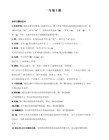
达?芬奇:意大利文艺复兴时期著名的画家,他是一位集画家、雕刻家、建筑师、工程师及科学家等多种才艺于一身的“怪杰”。代表作品《蒙娜丽莎的微笑》现为法国巴黎卢浮宫博物馆的镇馆之宝,创作于1504年左右。画中的蒙娜丽莎成为美学的,哲学的象征性形象,蒙娜丽莎的微笑引得人们不断地回味和探索。
米开朗琪罗:在雕塑方面成就最高,代表作为:《大卫》、《西斯梦大教堂》和《摩西》,其作品有着宏大的气势。
(一)13世纪属文艺复兴运动早期
“文学 三杰”
但丁(1265至1321)是文艺复兴时期意大利著名的诗人,是“人文主义思想的先驱”,在《神曲》中表露了其反对中世纪的蒙昧主义,提倡文化,尊重知识的新思想。
彼特拉克(1304至1374)被称为“人文主义之父”,代表作为《阿非利加》和《歌集》
薄伽丘(1313至1375),其代表作为《十日谈》书中讲述了100个故事,通过几位主人公的经历揭露了中世纪时期教会的黑暗和对人们的精神桎梏。生动的展现了当时的社会,是一部不朽的时代之作。
(四)16世纪下半期至17世纪上半期为文艺复兴晚期
其间产生了威尼斯画派,乔尔乔内、提香(1490至 1576)、委罗奈斯和丁托列托是该画派的四大家,还有三位著名科学家、思想家:布鲁诺、伽利略和康帕内拉,其科研成果不是完全正确的,但他们不畏教会的桎梏,甚至献出了生命,为科学的发展奠定了基础。
欧洲文化史的五个阶段

欧洲文化史欧洲文化略分五个时期。
一、古典时期( the Classic Age, 1200 ~476 )主要是古希腊文明(the Ancient Greek Civilization)及古罗马文明(the Ancient Roman Civilization)。
奉行的是异教徒的信仰和实践(Paganism)。
异教徒指非基督教徒,非犹太教徒,非伊斯兰教徒。
理念上鲜有束缚,实践中享受人生,个性突出,热情奔放,创造力旺盛,风格多姿多彩。
二、中世纪时期(the Middle Ages, 476~1453)主要是罗马天主教的教会文化(the Church Culture),强调人的原罪(the original sin),人性受到压抑(inhibited),文化上是一泓死水(cultural backwater)。
这一时期的主流是对古典时期的反动。
反主流的代表人物是但丁( Alighier,Dante,l265~1321),杰作是史诗《神曲》(Divine Comedy)。
三、文艺复兴时期(the Renaissance, 15~16C)古典主义的复兴,遵循的是人文主义(Humanism),这是对中世纪经院哲学(Scholasticism)的对抗(reaction)。
代表人物有:1. 米开朗琪罗(Michelangelo Buonarroti,1475~1564):代表作有梵蒂冈教皇(Pope,pontiff)专用西斯庭小教堂(The Sistine chapel)穹顶上的壁画《创世纪》,(Genesis)以及圣坛后的壁画《最后的审判》(The Last Judgment),雕塑《大卫》(David)等。
米氏又是建筑师、诗人。
2. 达芬奇(Leonardo da Vinci,1452~1519):代表作有《蒙娜丽莎》(Mona Lisa),《最后的晚餐》,(The last Supper)。
是画家,又是雕塑家、建筑师、音乐家、工程师,确是多才多艺(versatile)。
欧洲文化史
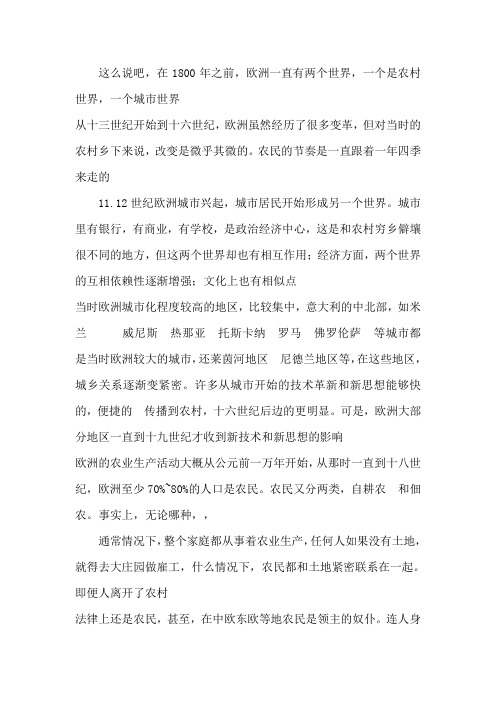
这么说吧,在1800年之前,欧洲一直有两个世界,一个是农村世界,一个城市世界从十三世纪开始到十六世纪,欧洲虽然经历了很多变革,但对当时的农村乡下来说,改变是微乎其微的。
农民的节奏是一直跟着一年四季来走的11.12世纪欧洲城市兴起,城市居民开始形成另一个世界。
城市里有银行,有商业,有学校,是政治经济中心,这是和农村穷乡僻壤很不同的地方,但这两个世界却也有相互作用;经济方面,两个世界的互相依赖性逐渐增强;文化上也有相似点当时欧洲城市化程度较高的地区,比较集中,意大利的中北部,如米兰威尼斯热那亚托斯卡纳罗马佛罗伦萨等城市都是当时欧洲较大的城市,还莱茵河地区尼德兰地区等,在这些地区,城乡关系逐渐变紧密。
许多从城市开始的技术革新和新思想能够快的,便捷的传播到农村,十六世纪后边的更明显。
可是,欧洲大部分地区一直到十九世纪才收到新技术和新思想的影响欧洲的农业生产活动大概从公元前一万年开始,从那时一直到十八世纪,欧洲至少70%~80%的人口是农民。
农民又分两类,自耕农和佃农。
事实上,无论哪种,,通常情况下,整个家庭都从事着农业生产,任何人如果没有土地,就得去大庄园做雇工,什么情况下,农民都和土地紧密联系在一起。
即便人离开了农村法律上还是农民,甚至,在中欧东欧等地农民是领主的奴仆。
连人身自由都没有这样就更不可能离开农村了,农民靠土地来活得口粮,基督徒,每天都要按圣经里的祷文向神祷告,旧约里面,还提到“你必汗流满面,方得糊口当时的欧洲遍地都是庄园和土地产业,虽然当时的经济贸易在逐渐发展,但整个社会仍然是农业性质的。
当时的欧洲遍地都是庄园和土地产业当时的村落中心是地主的城堡或一般的住宅,别以为地主很威风,事实上,有些地主混的和农民差不多,简陋的只用树枝条涂泥做墙,好一点的用石块垒墙住的真不舒服,村里另一个建筑物必不可少那就是教堂,地主庄园代表着农村经济社会政治的统治者,教堂呢就是灵性和文化通知的代表。
至于食物,则取决于天气和土地的肥瘠条件西欧的气候是温带海洋性气候,全年温和湿润,降水比较均匀。
欧洲文化史

欧洲文化史欧洲文化史是一个丰富多彩的领域,涵盖了几千年的历史和各个国家的文化演变。
从古代希腊罗马文明到文艺复兴时期的人文主义运动,再到现代的多元文化融合,欧洲的文化历程可以说是人类文明发展的重要组成部分。
古希腊和罗马文化是欧洲文化史的开端。
古希腊的文化对于西方文化产生了深远的影响。
在古希腊,诗人、哲学家和艺术家们创造了许多伟大的文化成就,如荷马的史诗《伊利亚特》和《奥德赛》,柏拉图的哲学思想等等。
而在罗马,科学、法律和工程方面的成就都为欧洲文化的发展奠定了基础。
中世纪是欧洲文化史上一个重要的时期,它被视为文艺复兴的前奏。
在这个时期,宗教在欧洲文化中起到了主导作用,基督教信仰深深地影响了社会生活、艺术和文学。
修道院成为了学术研究和知识传承的中心。
同时,中世纪的骑士精神和十字军东征也为欧洲文化增添了一份浪漫的色彩。
文艺复兴时期标志着欧洲文化的重大转变。
在这个时期,人们开始重新对古希腊和罗马文化产生兴趣,开始重新研究古代的文化和哲学。
这种对古代文化的追溯,激发了人文主义运动的诞生。
人文主义者强调人类和人类价值,认为每个人都应该有机会接受教育并发展自己的才能。
人文主义的理念在文学、艺术和科学方面都有所体现,为欧洲文化的繁荣做出了巨大贡献。
17世纪和18世纪是欧洲启蒙运动的时期,该运动对欧洲文化产生了深远的影响。
启蒙运动强调理性、科学和个人自由。
许多哲学家和思想家,如伏尔泰、卢梭和洛克,提倡民主、平等和人权。
启蒙运动还促进了科学和技术的发展,开创了工业革命的先驱。
这个时期的文化象征了欧洲文化转型的重要节点。
19世纪和20世纪,欧洲经历了许多巨大的变革,这些变革影响了欧洲的文化风貌。
从浪漫主义到现代主义,从世界大战到全球化,欧洲的文化经历了多样的流派和思潮。
艺术家们通过他们的作品表达对社会和政治现象的关切,揭示了欧洲在这个时期所经历的动荡。
如今的欧洲文化是多元且包容的。
欧洲各个国家的文化相互交融,形成了一个多元的文化景观。
欧洲文化史4(中世纪与封建社会)
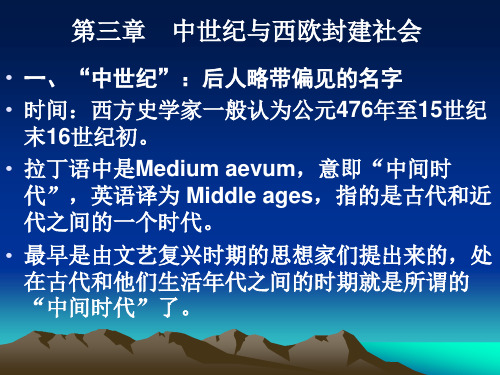
•
(三)西欧封建社会的生活状况
查 (理 当从 时这 曼 一位 在 般伟 亚 人大 琛 的帝 的 居王 皇 住的 宫 和简 复 生陋 原 活皇 模 条宫 型 件, )可 以 想 见
封 建 社 会 的 金 字 塔 式 等 级 结 构
•
中世纪的庄园生活并不像后来的浪漫主 义者们所描写的那样,充满了田园诗般恬 静优美的情调。虽然城堡中的贵族们和教 区里的教士们在生活资料方面用不着担忧, 拥有吃不尽的粮食、肉类和其他生活必需 品,但是他们的生活条件却十分糟糕
第一次十字军东征结束后,穆斯林又开始威胁和逐 渐蚕食西方人设在东方的那些据点和公国。于是基 督教世界又组织了一系列不成功的十字军东征
•
(三)“阿维农之囚”与罗马教会的衰 落
•
1302年,雄心勃勃的法王腓力四世召开了 法国第一次三级会议,反对罗马教皇充当法 国的太上皇,并推选出法国波尔多大主教继 任教皇,即克雷芒五世,并且把教廷从罗马 迁至法国的飞地阿维农,置于法王的控制之 下。从此开始了长达七十年之久的“阿维农 之囚”时期(1305-1377年)
丕 平 三 世
公元800年,罗马教皇为查理举行皇帝加冕礼。
(2)查理曼的文化功绩
查理曼的功绩并不是一味扩张领土,而是注重西欧的 政治、法律与文化建设,这对西欧历史的发展影响巨大: – 在政治上,他进一步完善地方行政制度,全国划分为 250个伯爵区, 由伯爵(count)管理,每个伯爵负责 在自己的土地上组织军队和执行法律。边境地区设军 事总督,并派出巡按使(Missi dominici)到各地视 察,监督法律的执行。在边界建立一系列边界地区 。 – 在法律上,他常常发出一些赦令。但中央政府的管理 还是较为原始的。 – 在文化上,查理曼推崇基督教文明,宏扬古希腊罗马 文化。
欧洲文化史2(古希腊、古罗马)

至
神话传说相融合。
高 神
宙
斯
(二)希腊神谱
在“黑暗时代”末期,将逐渐黯淡的克里特、迈锡 尼神话传说传给希腊人的主要是赫西俄德的《神谱》 和荷马的两部史诗。他们通过一种开创性的编纂整理 工作,把一个系统化了的美丽无比的希腊神话世界呈 现在走出“黑暗时代”的希腊人面前。
希腊人在追溯自己的家族谱系时也相应地整理出一 套神的谱系,因为希腊人相信作为自己祖先的英雄们 必定有一个神的起源。在希腊人眼里,神与神的后裔 是神,而神与人的后裔则是英雄,这些英雄往往又被 当作王者的始祖。按照这种家族起源的解释方式,自 然而然地从英雄谱系上溯到诸神的谱系。
第三:设立公共食堂,所有的斯巴达人都必须在指 定的食堂里共同就餐。
(四)雅典的政治与文化
雅典人的城邦生活
开明贵族德拉古在公元前621年制定了 第一部成文法典,对贵族权利进行了限 制;
梭伦在公元前594年进行了更为彻底 的政治改革,通过法律的形式废除了债 务奴隶制,设置了四百人会议和公民陪 审法庭;
在公元前6世纪前后,地中海地区的各种大大小小的 城邦多如牛毛。这种分离主义的政治态度和自由主义 的生活信念构成了希腊城邦社会的重要特征。
地中海地区的民族大迁徒(12BC-8BC)
(二)早期希腊城邦的政治变革 希腊城邦政体的一般发展模式: 君主制—僭主制—民主制
(
三
)
斯 巴
李 奥 尼
达 的
达 在 温
希腊神话的基本特点——神人同形同性
1、神人同形,就是神和人一样,有着人的 形态和肉体。
希腊人竭力以美丽的人体为楷模,结果竟奉为 偶像,在地上颂之为英雄,在天上敬之如神明。
——丹纳
2、神人同性,就是神和人一样,有着人的喜 怒哀乐,七情六欲,优点和缺点。
欧洲文化中世纪四位伟大的人物

欧洲历史的中世纪大致可分为三个时期。
公元5-11世纪为初期,是封建社会形成时期;公元12-15是中世纪的中期,也是它的全盛时期;公元16-17世纪是中世纪的末期,是封建社会衰落瓦解和资本主义兴起的时期。
中世纪的最初几个世纪是在混战的状况中。
在日耳曼人建立的王国中,以六世纪法兰克王国最强大。
公元8世纪末和九世纪初,法兰克国王查理曼大帝建立了强大的帝国。
查理曼国王在1800年被教皇加冕,授予“罗马皇帝”之称。
查理曼大帝应该说是中世纪早期最重要的人物了。
在学术和科学方面,中世纪的欧洲知识为即将道来的西方新兴世界作一些铺垫。
查理曼大帝(Charlemagne)和他的卡罗林复兴(Carolingian Renaissance),阿尔弗莱德大帝(Alfred the Great)和他的学术中心,还有意大利神学家阿奎那(St. Thomas Aquinas)的经验哲学(Scholasticism)和托马斯主义,英国哲学家、科学家培根(Roger Bacon)的实践的重要意义,无一不对文化的保存与发展做出了巨大的贡献。
Charlemagne and Carolingian RenaissanceBackgrounds•Born in Aachen city in 742, where became his capital later•Grandpa. Charles Martel was mayor of palaceof the Merovingian Dynasty•His father Pepin Ⅲ was the king of L‘empire carolingien(法语:法兰克帝国), who was also created the les Carolingiens (法语:加洛林王朝)• A great organizer 、administrative person and the real politician • A great barbarian• The father of the European查理大帝与“加洛林文艺复兴”查理大帝是欧洲中世纪史上一位赫赫有名的人物。
欧洲文化史过程

欧洲文化论文—机械工程学院CLl002:罗稳希腊罗马文化可以说是欧洲文明的起源,她形成于公元前800-500年,经历了古典时代(也就是公元前500到公元前336年)和希腊化时代(也就是公元前336年到公元前31年)。
希腊文明达到顶峰是公元前5世纪。
公元前146年,希腊被罗马攻克。
希腊文明也就被罗马文明所取代。
1、公元前12世纪,随着特洛伊人的入侵,希腊堕入“黑暗时代”。
荷马史诗描述的正是希腊人与特洛伊人之间的战争(《以利亚特》和《奥得赛》)。
这里要注意的是,荷马史诗描述的时代并非荷马生活的时代。
荷马生活在公元前700年。
4、伯罗奔尼撒战争后,斯巴达专横跋扈,底比斯和雅典为求相互保护而结成新的联盟。
公元前371年,马其顿国王腓力二世打败了底比斯和雅典联军,他的闻名世界的儿子亚历山大大帝统治了希腊。
至此,古典时代结束,希腊化时代即将开始。
古典时代的希腊造就了一批哲学家和剧作家。
哲学家主要以苏格拉底、柏拉图和亚里士多德为代表。
苏格拉底提出自由辩论的重要性。
柏拉图的目标是要实现一个既能维持贵族特权,又可为贫苦阶级接受的社会,并构件了唯心主义的根基。
亚力士多德寻求自然界和人类社会各个方面的秩序。
剧作家有埃斯库罗斯、阿里斯托芬、索福克勒斯。
这一时期希腊也造就了像阿基米德和欧几里得这样的数学家,以及像希罗多德和修昔底得这样伟大的历史学家。
希腊的艺术和建筑在神庙上得到最高体现。
著名的雅典卫城的圣地帕台侬神庙就是卫雅典娜女神建造的。
希腊化时代与罗马时代前期相互交融,最终过渡到罗马时代。
在政治文化方面,罗马出现了以下比较重要的人物:恺撒卢克来修维吉尔 .在建筑、艺术方面,罗马人也做出了突出的贡献。
如:圆形大剧场和建于公元前27年的罗马万神殿以及女狼雕塑等。
17世纪的欧洲在历史舞台上,揭开了近代史的序幕。
这一时期,天文学、物理学、数学等科学都取得了很大发展。
在创立科学方面,有四位杰出的科学家:波兰的哥白尼、德国的开普勒、意大利的伽利略和英国的牛顿。
《新文化史名著导读》参考书目
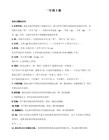
19. (意)艾柯:《诠释与过渡诠释》,北京三联,2005年。
20. (美)彼得·盖伊(Peter Gay)著:《施尼茨勒的世纪:中产阶级文化的形成,1815-1914》,北京大学出版社,2006年。
40. Lynn Hunt ed., The New Cultural History. University of California Press, 1989.
41. Erwin Panofsky, Studies in Iconology, Humanistic Themes in the Art of the Renaissance. Harper & Row, Publishers, 1972.
44. Georges Duby, The Three Orders, Feudal Society imagined. University of Chicago Press, 1980.
45. E. E. Evans-Pritchard, Witchcraft Oracles, And Magic Among the Azande. Clarendon Press, Oxford. 1976.
36. Steven L. Kaplan ed., Understanding Popular Culture, Europe from the Байду номын сангаасiddle Ages to the Nineteenth Century. Mouton Publishers, 1984.
37. Peter Burke, The Italian Renaissance, Culture and Society in Italy. Princeton University Press, 1986.
欧洲文化史 彼得李伯庚读后感

欧洲文化史彼得李伯庚读后感篇一欧洲文化史彼得李伯庚读后感哎呀,读了彼得李伯庚的《欧洲文化史》,我这脑子简直像被塞进了一个万花筒,五颜六色,眼花缭乱的!你说欧洲文化这玩意儿,那可真是复杂得让人头疼又着迷。
也许有人会觉得,不就是些过去的事儿嘛,有啥大不了的。
但我觉得吧,这可大错特错!它就像一个神秘的宝藏箱,每打开一层都能让你“哇塞”一声。
书里讲的那些个艺术、哲学啥的,有时候我觉得自己好像能懂,可有时候又觉得自己像个傻瓜,完全摸不着头脑。
比如说那些个古希腊的雕塑,美是真美啊,可我就在想,当时的人咋就有那么厉害的手艺和想象力呢?也许是老天给他们开了外挂?还有那些哲学家们的思想,我的天,一个个高深莫测的。
我就想问,他们咋能想那么多稀奇古怪的东西?难道他们不睡觉,天天就琢磨这些?我觉得我要是生在那个时候,可能早就被这些东西给逼疯了。
不过话说回来,读这本书也让我有点儿小骄傲。
为啥?因为我感觉自己好像在和那些伟大的头脑对话,虽然经常是我听不懂他们在说啥。
但这一路读下来,我觉得自己好像也成长了那么一点点,可能?这欧洲文化史啊,真的是让人又爱又恨,你们说是不是?读了彼得李伯庚的《欧洲文化史》,我这心里真是五味杂陈,感慨万千呐!我一开始翻开这本书的时候,心里还嘀咕着:“能有多精彩?”结果,好家伙,直接给我“整懵了”!欧洲文化的丰富多样,简直就像一个巨大的迷宫,我在里面转得晕头转向。
书中描述的那些古老的建筑,雄伟壮观得让人惊叹不已。
我就在想,古人咋就能造出这么牛的东西?难道他们有超能力?比如说罗马的斗兽场,那规模,那气势,我仿佛能听到当年观众们的呐喊声。
这难道不是一种奇迹吗?再说说欧洲的文学,那可真是让人陶醉。
像莎士比亚的作品,充满了激情和智慧。
但有时候我又在想,那些复杂的词句和隐喻,是不是作者故意为难我们读者呢?也许是为了显示他们的才华?还有音乐,贝多芬、莫扎特这些大师的作品,听着是那么美妙动人。
可我又忍不住问自己,我真的能完全理解其中的情感吗?我觉得可能我只是领略到了皮毛而已。
- 1、下载文档前请自行甄别文档内容的完整性,平台不提供额外的编辑、内容补充、找答案等附加服务。
- 2、"仅部分预览"的文档,不可在线预览部分如存在完整性等问题,可反馈申请退款(可完整预览的文档不适用该条件!)。
- 3、如文档侵犯您的权益,请联系客服反馈,我们会尽快为您处理(人工客服工作时间:9:00-18:30)。
欧洲文化史
本书四大特点:
1 它破除勒历来这类书的“欧洲中心论”框架,把欧洲文化的发展放到欧洲和其他地区的相互关系中去考察。
2 着力把握了欧洲文化历史中的“一”和“多”的关系。
欧洲历史在古希腊、罗马、神圣罗马帝国之后,就再没有一个中心王朝或民族,比中国更复杂得多。
而在这种复杂多样性中,又有同一性,也就是拼音文化书写体系和基督教会。
3 本书把大众文化如社会各阶层的不同生活方式,怎样支配闲暇时间等也囊括进来,体现了作者对文化的更宽阔的视野和更深刻的理解。
4 对当代中国人来说,最重要的一点便是:从文化发展的具体历史中把握文化的特性。
本书作者荷兰天主教尼梅根大学文化历史系教授彼得·李伯庚(Peter Rietbergen)是欧洲文化史的权威,本书为其苦心孤诣之作。
作者旁征博引众多历史资料与参考文献:从公元前17世纪巴比伦的汉谟拉比法典石碑到1095年的教皇乌尔班二世号召十字军动征;从1538年文艺复兴时期意大利艺术巨擘米开朗基罗的雕刻到20世纪80年代后期流行歌手斯汀的歌词——这些均一一囊括其中。
本书绝对是一本既全面又具启发性的欧洲文化史概览。
本书原版于1998年,问世后,迅即在欧洲传播开来。
1999年登陆美国、加拿大,多次再版。
本书繁体中文版于2003年3月在香港出版,亦引起强烈反响。
无疑,这将是时间长河中的一部文化史经典。
欧洲文化史(上下册)
目录:
译序面对大海的断想
导论在历史中的今日欧洲
第一部生存的新方式
第一章欧洲还未命名的时期——朝农业和定居社会的发展
第一节源自非洲和东地中海地区的欧洲文化
第二节农业、神殿和国家的兴起
第三节侵入、征服和变化:第一波
第四节公元前17世纪的巴比伦:汉谟拉比法典
第五节末次冰川时期后的欧洲
第六节侵入、征服和变化:第二波
第七节一种边缘文化?以色列宗教和国家的形成
第八节另一种“边缘”文化?腓尼基的交通和贸易活动
第九节又一种“边缘”文化?希腊的民主政制和它的局限性
第十节又一种“边缘”文化?欧洲克尔特人的部落社会
第十一节“欧洲的诞生”和“希腊人的世界观”;或“如何为自己的文化下定义”
第十二节亚历山大大帝的世界
第二章罗马和它的帝国——文化融合的作用及其局限性
第一节早期罗马人的扩张
第二节由非正式帝国到正式帝国
第三节公元2世纪的罗马帝国:一种法律制度和法制社会——罗马的贡献
第四节罗马文化
第五节罗马帝国和它以外的世界
第三章罗马帝国的沦亡和另一个王国的胜利——基督教和罗马帝国
第一节在犹太人世界里的演化发展:基督教的诞生
第二节从犹太人——到外邦人——到基督徒:拿撒勒人耶稣及其追随者的功绩
第三节罗马帝国的各种宗教
第四节下层贱民的一个教派
第五节公元180年在迦太基就基督教进行辩论的情况
第六节一个既是罗马又是基督教的帝国之形成
第七节公元4、5世纪的罗马及其邻近地区:政治帝国的瓦解和文化帝国的残留
第八节帝国和语言
第二部信仰的新形式
第四章走向一种普世性新宗教
第一节基督教世界观:古典文化在基督教和欧洲的脉络关系中保留下来
第二节公元547年的西奈山:考司玛斯所解释的基督教宇宙观
第三节一种适应普世的宗教:基督教和欧洲的融合
第四节一个新帝国的兴起:法兰克人的政治体制和基督教会对它的理论维护
第五节文化与黏合:
意识形态和教育在形成加洛林王朝对欧洲统治中的作用,或称做“第一次文艺复兴”?第六节修道院的影响
第五章地中海周围的三个世界——西方、东方基督教国和伊斯兰
第六章一体世界和多种传统——上层文化与大众文化
第三部对人与世界的新看法
第七章一个新社会——欧洲出现各种对人的新观点
第八章一个新社会——欧洲成为一个更广阔的世界
第九章一个新社会——由15世纪开始的欧洲与广大的世界
第十章一个新社会——移民、旅行以及在欧洲的文化扩散与整合
第十一章一个新社会——以文坛谋求正义的世界,反对分裂的现实世界
第十二章一个新社会——由人文主义到启蒙运动
第四部消费和交流的各种新形式
第十三章欧洲的几次革命——是面向大众的自由和提高消费吗?
第十四章进步和相随的不满——民族主义、经济增长和文化自信的问题
第十五章欧洲与其他各个世界
第十六章西方的没落——幻梦的失落?由19世纪到20世纪
第十七章走向一个新欧洲?
尾声今日欧洲:面向未来。
